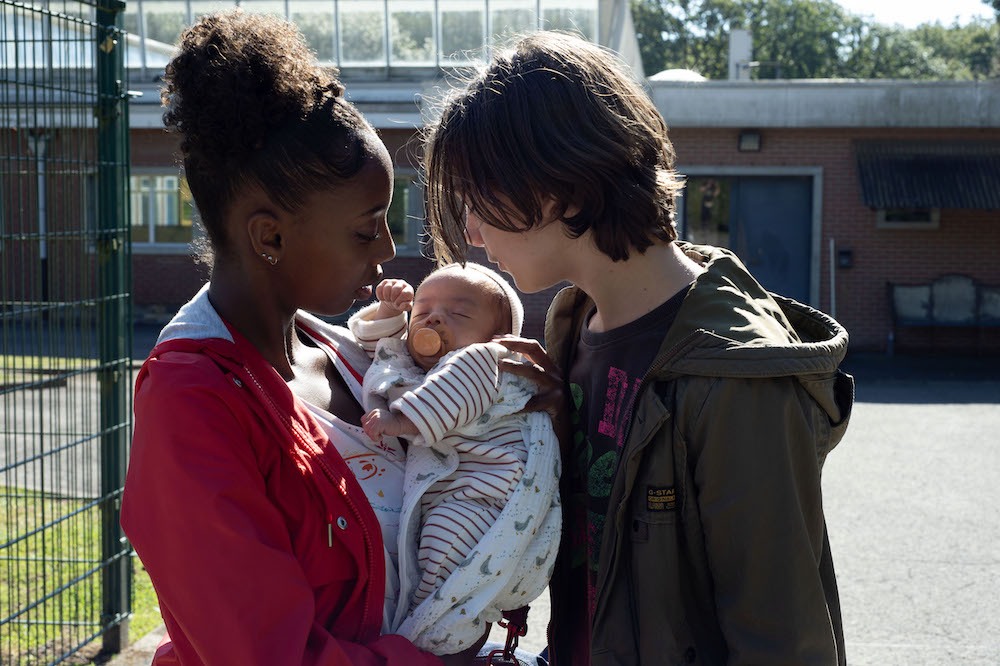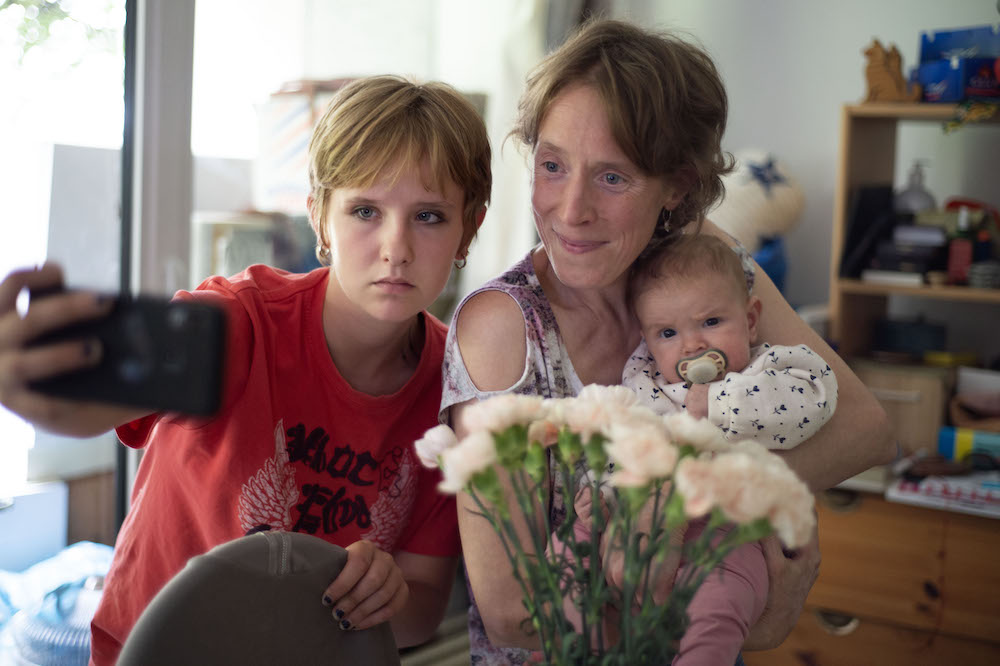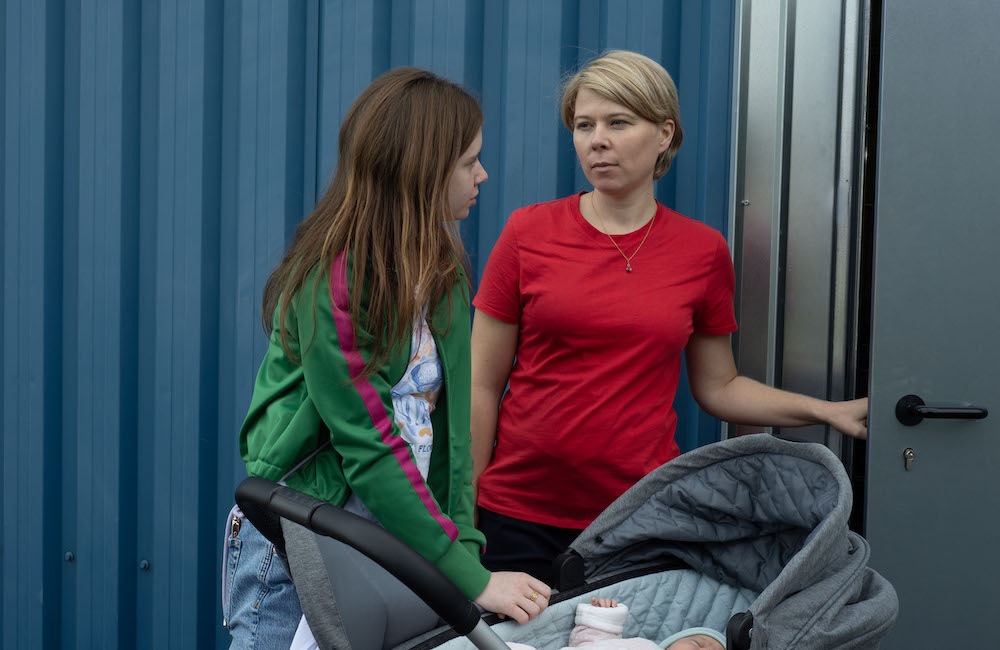“Not even an animal would do what she did.” Jessica (Babette Verbeek) is speaking about her biological mother, who abandoned her when she was a baby, leaving her to grow up in care. Now Jessica, a teenager, is pregnant, just as her mother was, and is obsessed with finding her. She demands answers, as well as love.
Brothers Jean-Pierre and Luc Dardenne’s 13th feature film won the best screenplay award at Cannes (they’ve won the Palme d’Or twice) and it’s an extraordinarily compelling picture of life in a maternal support home. Less harrowing than some of their work, it’s set in Liège, Belgium, their usual stamping ground, and employs their trademark tightly plotted social realism and hand-held camera work. But unusually for the Dardennes, there are five protagonists. Many of them are first-time film actors, including Verbeek and the impressive Lucie Laruelle as Perla – though all five are excellent and seem wonderfully real.
Their predicaments are similar in some ways: most are haunted by their own inadequate or abusive parenting and whether can they find the strength, as teenagers, to care for their babies, after deciding against abortion (several considered it but changed their minds). Yet the Dardennes bring each to life as a rounded individual with very different obsessions, problems and choices.
 Perla, who’s on medication for alcohol abuse and tends to forget it’s her turn on the dinner rota, cannot accept that her child-like boyfriend, Robin (Gunter Duret; both pictured above), who’s just been released from a detention centre (she brings him a welcoming spliff), has no interest in supporting her and her baby Noé. She can’t countenance life as a single mother and yearns for respectability. “Would you stay with me if I put Noé into foster care?” she asks tragically, after desperately pursuing Robin for days.
Perla, who’s on medication for alcohol abuse and tends to forget it’s her turn on the dinner rota, cannot accept that her child-like boyfriend, Robin (Gunter Duret; both pictured above), who’s just been released from a detention centre (she brings him a welcoming spliff), has no interest in supporting her and her baby Noé. She can’t countenance life as a single mother and yearns for respectability. “Would you stay with me if I put Noé into foster care?” she asks tragically, after desperately pursuing Robin for days.
The maternal support home is, indeed, wonderfully supportive, with several case workers and a psychologist (Claire Bodson) on hand to teach parenting skills and to help in a way that’s firm yet gentle. The atmosphere is subdued, though there are explosions of painful emotion. And there’s one jolly lunch where Naima (Samia Hilmi) is thrilled to share the news that she’s been accepted on a course to become a railway ticket inspector: “It was my dream.”
The story of Ariane (Janaina Halloy Fokan) is particularly compelling. Her chaotic mother, Nathalie (Christelle Cornil; both pictured below) is only too keen on being there for her and has even done up a room in her flat for baby Lili. But Ariane is unwilling to give the alcoholic Nathalie a second chance. She has an abusive ex-partner who Ariane is terrified of. “I tremble when I see him,” she tells her mother after he comes to the flat to retrieve his cowboy boots.
 Nathalie scoffs: he didn’t hit you as much as he did me, she says. “Yes, but you like it,” says Ariane, and her mother reacts by slapping her and then begging forgiveness. To Nathalie’s horror, Ariane, who has dreams of being a teacher or a pilot, wants to entrust Lili to foster parents who can give her a better life and, most importantly for Ariane, teach her to play an instrument. “What is this word entrust? The shelter has turned you against us,” fumes Nathalie. “We’re too poor for you.” And when Ariane does hand a smiling Lili over to the foster parents, it’s heartbreaking.
Nathalie scoffs: he didn’t hit you as much as he did me, she says. “Yes, but you like it,” says Ariane, and her mother reacts by slapping her and then begging forgiveness. To Nathalie’s horror, Ariane, who has dreams of being a teacher or a pilot, wants to entrust Lili to foster parents who can give her a better life and, most importantly for Ariane, teach her to play an instrument. “What is this word entrust? The shelter has turned you against us,” fumes Nathalie. “We’re too poor for you.” And when Ariane does hand a smiling Lili over to the foster parents, it’s heartbreaking.
Julie (Elsa Houben) seems to have her life sorted: she has a loving boyfriend, Dylan (Jef Jacobs), who’s got an apprenticeship at a bakery, while she’s training to be hairdresser. They’ve found a flat and are getting married. But she’s an ex-junkie, though not, it turns out, completely ex – she has panic attacks, forgets to pick up their baby Mia from the crèche, and relapses and overdoses. “I’m a liar,” she tells Dylan when he visits her in hospital. But Mia, she explains, is the only true thing, and their life together still seems hopeful.
 Jessica, who looks younger and more lost than the others, regards herself and her baby, Alba, in the mirror. “I feel nothing,” she says. “I wish I did. I don’t even have milk.” She throws herself on her bed and cries. All she cares about is confronting her mother (India Hair; both pictured above) and finally she does, after being coldly rejected once. Don't contact me again and don't come to my home, says her unsmiling mother. But refusing to give up, Jessica follows her to her work place.
Jessica, who looks younger and more lost than the others, regards herself and her baby, Alba, in the mirror. “I feel nothing,” she says. “I wish I did. I don’t even have milk.” She throws herself on her bed and cries. All she cares about is confronting her mother (India Hair; both pictured above) and finally she does, after being coldly rejected once. Don't contact me again and don't come to my home, says her unsmiling mother. But refusing to give up, Jessica follows her to her work place.
“I feel I’m like you were with me,” she sobs. They hug, or rather her mother allows herself to be hugged, and at last explains that she gave Jessica up because she didn’t want to be a single mother, shunned as the local slut. She’s still lukewarm but at least invites her in to sit down and feed Alba. You feel that, just maybe and with a great deal of luck, the generational cycle of neglect and deprivation might be broken.













Add comment